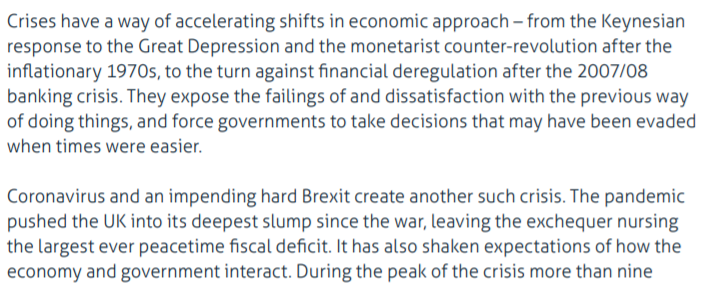
OK, long overdue, overlong thread thinking about Rachel's fundamental question here. My first reaction was to see what I have learned from the responses to my original tweet; is the answer necessarily "more business investment"? 1/18
https://twitter.com/racheljanetwolf/status/1367907839969222661
1st obvious point: not necessarily. Biz inv can be wasted. More formally, it depends on your on marginal productivity of capital, depreciation, etc. Here a chart from a toy model where you pass quite soon the point at which more saving into capital no longer> higher wages 2/ 

A point @t0nyyates put neatly here,
There is an optimal K/L. But as others point out it is highly suggestive that we went below that overall level 3/
https://twitter.com/t0nyyates/status/1367849275959443457
There is an optimal K/L. But as others point out it is highly suggestive that we went below that overall level 3/
Since our actual investment in recent years has been low, and productivity growth low too, that is highly suggestive of it playing a role (see @JamesSmithRF
https://twitter.com/JamesSmithRF/status/1367848896915988487for an advocate of this). But as he goes on to say 4/
... what if the causality is the other way round? Lower aggregate demand causes lower investment, hitting growth potential?
Here a slide from a heretical pack I made for Downing St in 2018 called "Time to revisit the Demand Side" 5/
https://twitter.com/JamesSmithRF/status/1367854743549321216
Here a slide from a heretical pack I made for Downing St in 2018 called "Time to revisit the Demand Side" 5/

Total heresy of course: it appears to go against decades of learning since 1976, a Labour PM said this... The whole speech is fascinating, of course 6/ 

But I find the simultaneous arrival of sub-trend AD growth, poor productivity growth, and a giant apparent increase in the UK supply of labour too much to justify keeping the old playbook open all the time. Others like Yellen have mused on this federalreserve.gov/newsevents/spe… 7/ 

Anyway, to your original question: what is *proven* to boost productivity in the UK? Lots of answers. Naming just three
- Strong correlations with poor skills
- Poor health in places (this by NHSA I found very persuasive thenhsa.co.uk/2018/11/major-…)
8/
- Strong correlations with poor skills
- Poor health in places (this by NHSA I found very persuasive thenhsa.co.uk/2018/11/major-…)
8/
& badly run businesses. Normally people quote Andy Haldane for this point but it is longstanding, and I think the Business Productivity Review has the most thorough look at this 9/ assets.publishing.service.gov.uk/government/upl… 

But some - most terrifyingly, @ChrisGiles_ - have taken issue with this idea (see e.g. ft.com/content/cd4025…) Basically, they see this as a story of a few big sectors letting us down. We need to aim at those sectors, presumably? 10/
This builds off a work by @CentreforCities here centreforcities.org/blog/tackling-… which basically walks up to Andy Haldane and slaps him round the face with a glove. Rude. centreforcities.org/publication/th… But clearly so good I remembered that it was written by @Paul_Swinney 3 years later 11/
Basically this asks us to look at the competitive, high value add exporting firms.
And this has a strong echo in the approach taken by Lord Sainsbury in "Windows of Opportunity", as interested party @dsquareddigest reminded me here
And this has a strong echo in the approach taken by Lord Sainsbury in "Windows of Opportunity", as interested party @dsquareddigest reminded me here
https://twitter.com/dsquareddigest/status/136786246201652429112/

I cannot summarise the whole book (you may have seen the review by this up-and-coming columnist ft.com/content/217f6d…) but insofar as it has a normative conclusion, the support you offer needs to be *targeted* - on the right sectors etc that exhibit increasing returns ... 13/
I think the book usefully reminds us that different sectors have radically different dynamics. I mean, look at cotton, 1770 onwards blog.hubspot.com/marketing/a-br… but there are several important caveats 14/ 

if your aim is to boost wages, the industrial revolution asks that you exhibit almost supernatural patience. I mean, while cotton grew productivity ten-fold, look at what the worker got - virtually nil for 100 years
And ordinary people in San Francisco don't all benefit ... 15/
And ordinary people in San Francisco don't all benefit ... 15/

& so I think the "just build a high value cluster already" people need a good theory for how the value spreads to the 95% of people NOT in the cluster. And if it were obvious how to build those clusters, a theory for why it hasn't happened ... (which DS has tbf) 16/
Anyway, concluding. My view: it is complex, contains elements of demand AND supply, forces us to ask questions about specific types of technology (labour enhancing vs replacing, see Frey), and the evidence for a *general* business K boost doing it is not wholly there. BUT 17/
nor (see my report instituteforgovernment.org.uk/publications/i…) do I think that the alternative to purely general measures - targeted industrial strategy - is in any way straightforward! Sorry!
Thanks for the indulgence, a helpful aide memoire for me
/18
Thanks for the indulgence, a helpful aide memoire for me
/18
Oh, another point I throw in by tradition now. We a mostly services economy, which >> lower productivity gains. Which @DietzVollrath argues means we should expect it lower in future years, all things equal. But worth reading @RichardALJones softmachines.org/wordpress/?p=2… on that too
• • •
Missing some Tweet in this thread? You can try to
force a refresh











